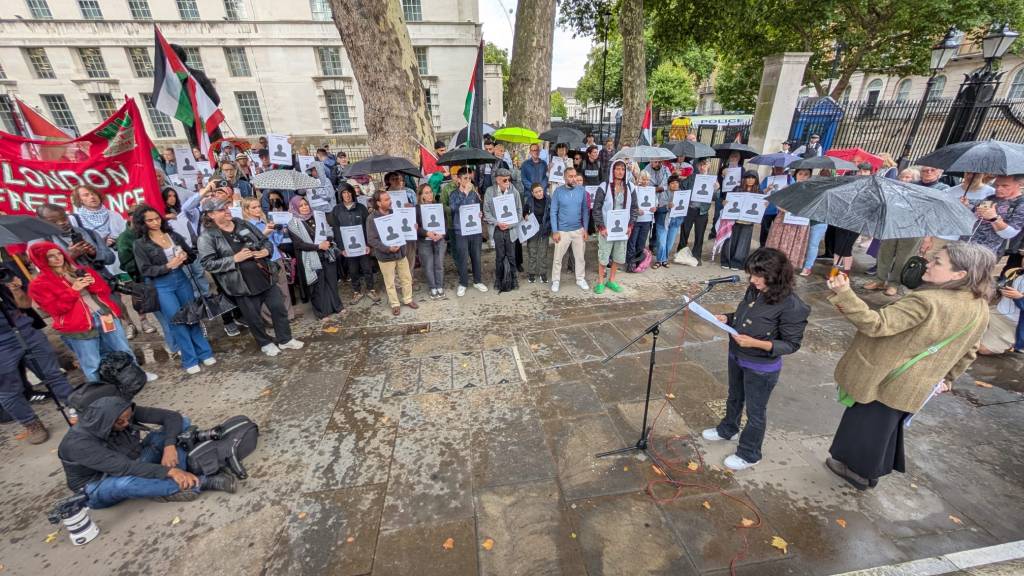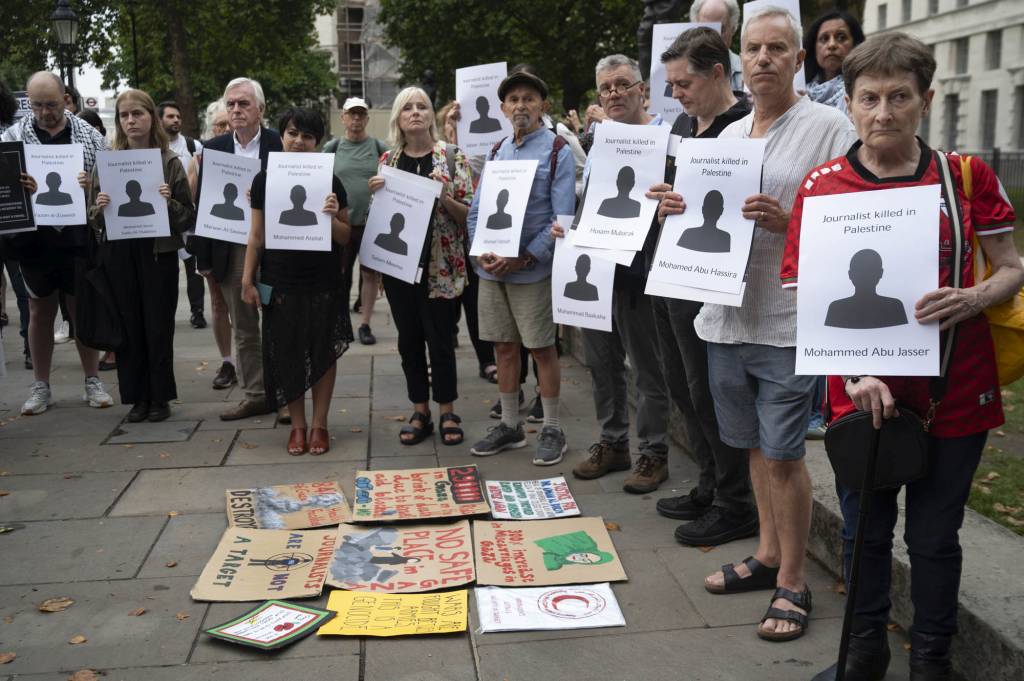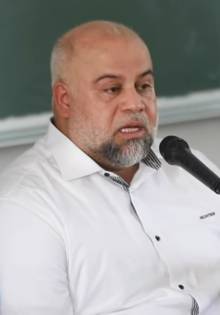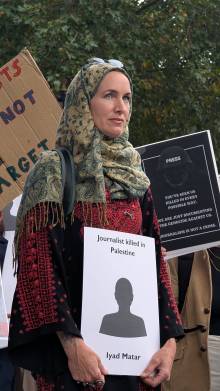For ‘the best of us’
FOLLOWING NUJ members’ response to Israel’s assassination of Al Jazeera crews in Gaza during August 2025 we saw a wider recognition in UK media of the courage of journalists in Gaza. Members held vigils honouring our colleagues in the Republic of Ireland, Northern Ireland, Scotland, Wales, England and Belgium.

Sangita Myska addresses the London Freelance Branch vigil on 27 August
Shock waves went through our profession when on 11 August Israeli forces deployed an airstrike on the press tent outside al-Shifa hospital, assassinating Al Jazeera reporter Anas Al-Sharif and camera operators Ibrahim Zaher and Moamen Aliwa; their assistant Mohammed Noufal and correspondent Mohammed Qreiqeh and the freelance photojournalist Mohammed Al-Khaldi.
An emergency London Freelance Branch committee meeting, organised a vigil opposite Downing Street on 13 August. Over 500 people joined and read the names of Gazan colleagues who have been killed.
The committee also resolved to deliver a letter to the Prime Minister. This requires ten working days’ notice for security vetting, which fixed the date for a second vigil on 27 August.
At both vigils we sought to recognise the courage and professionalism of our journalist brothers and sisters in Gaza and to highlight the bravery it takes for reporters to continue working with the expectation that they could killed or maimed at any moment.
National and international media coverage
The 13 August vigil was addressed by NUJ general secretary Laura Davison, John McDonnell MP and secretary of the NUJ All Parliamentary group as well as Branch training officer Mariam Elsayeh and Branch chair Pennie Quinton. Journalists held placards, each bearing the name of a journalist killed in Gaza, and read out their names one by one.

John McDonnell MP, third from left on 13 August
Although the 13 August vigil received extensive international coverage, there was little mainstream UK coverage.
On 25 August Israeli forces killed yet another five journalists in a “double tap” strike on Nasser Hospital in Khan Yunis: Hossam Al-Masri, a photographer working for Reuters news agency; Mohammed Salama, a photojournalist working for Al Jazeera; Maryam Abu Deqa, a journalist working for Associated Press and Independent Arab; Moaz Abu Taha, a freelance journalist working for NBC news; and Ahmed Abu Aziz, a freelance journalist working for Middle East Eye.
Following the second atrocity the branch delivered its letter to the Prime Minister with an addendum on the most recent killings. The letter was co-signed by the NUJ’s London Central Branch; London Magazine Branch; London Digital Media Branch; officials of the Financial Times Group Chapel; Brussels Branch; Ethics Council and Photographers’ Council. It was also supported by Khaled Shalaby, head of video operations for Middle East Eye - who had seen his colleague Ahmed Abu Aziz killed at Nasser Hospital just two days previously; and by Sarah Beddington, writer and director of Fadia’s Tree, an award-winning film about Palestinian exile.
The letter demanded to know what actual action the Prime Minster will take to address the mass killing of journalists. See the letter and the derisory response here.
Once more we gathered in grief opposite Downing Street with the Branch banner and another saying “stop killing Palestinian journalists”. As people arrived, they each took a placard with the name of one of the journalists killed and formed a long line stretching up towards Trafalgar Square. Branch chair Pennie Quinton opened the speeches, saying “to kill a journalist is a war crime”.

Wael Dahdouh
We played the recording that Wael Dahdouh of Al Jazeera had prepared especially for our event and Mariam Elsayeh read the English translation: “Fellow journalists have a huge duty to perform for their colleagues… More than 240 colleagues, both male and female, were martyred, exterminated, killed, or targeted by direct fire, simply because they did their duty. Many, many of their families were scattered, torn apart, and killed. Some of them are still wounded, and some of them are still prisoners in Israeli prisons… Therefore, with all the horrific and heartbreaking images coming from the Gaza Strip, you must do your duty. We expect a lot from you, a lot from your conscience, a lot from your morals, and we will continue to wait for you to carry out your duties with all humanity, all seriousness, and also with all professionalism.”
Broadcaster Sangita Myska described Palestinian journalists as “the bravest people in the world... they continue their work despite Israeli attacks and threats. But the West belittles their profession. At Nasser Hospital,” she said, “Israel, like terrorist organisations, carried out a second attack on those arriving at the scene after the first strike... If Russia had killed five journalists on live broadcast, do you think the British media would have ignored it? I don’t think so. A Palestinian journalist being killed is not just the death of one person - it is the death of journalism.” Sangita’s speech attracted wide attention, including an endorsement from singer Annie Lennox.
Palestinian journalist Ahmed Alnaouq, of Palestine Deep Dive, said: “Why does Israel kill journalists? Because it can. Because it knows it will answer to no one.” Ahmed movingly read aloud the last will and testament of journalist Maryam Abu Deqa, addressed to her son on the morning she was killed.
Dr. Omar Abdel-Mannan, a British-Egyptian paediatric neurologist and the founder and president of Health Workers 4 Palestine, a fundraising and advocacy group, spoke. We note that so many journalists were killed in press tents in hospital grounds.

Julia Katarina waits to read out the name of murdered journalist Iyad Matar
Classical musician and singer Julia Katarina sang the song Mawtini (“My Homeland”), that is often regarded by many Palestinians as their unofficial national anthem, the words of which are by the Palestinian poet Ibrahim Tuqan. We concluded with a brief Islamic prayer of mourning in absentia. There was both national and international coverage of the second vigil and the Freelance was relieved to see UK journalists recognising the work of colleagues in Gaza bringing us the news.
As Mehdi Hasan said at the 18 September Together for Palestine concert at Wembley, “the Gazan journalists are the best of us.”
London Freelance Branch hopes to see readers at an event to mark the United Nations day to end impunity for crimes against journalists on Sunday 2 November: see here.
 No impunity for crimes against journalists event 02/11/25
No impunity for crimes against journalists event 02/11/25
 We honoured the courage of Gazan journalists Branch vigil 27/08/25
We honoured the courage of Gazan journalists Branch vigil 27/08/25
 'You are our hope' surviving Gaza journalists appreciate our vigil on 13/08/25
'You are our hope' surviving Gaza journalists appreciate our vigil on 13/08/25
![[Freelance]](../gif/fl3H.png)